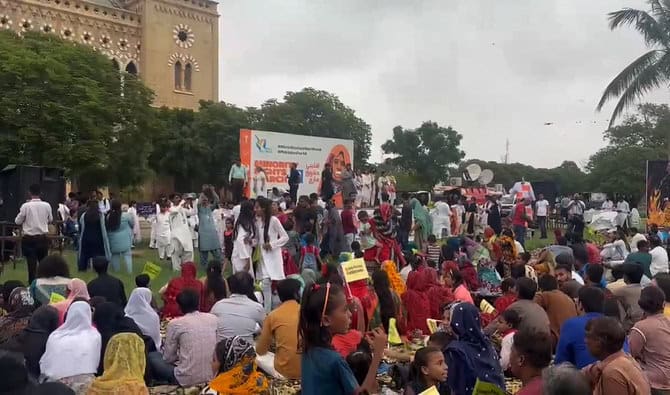Hundreds gathered in Karachi on Sunday for a minority rights rally, calling for an end to discrimination against minorities and the misuse of Pakistan’s blasphemy laws, despite threats from a religious group.
Blasphemy, punishable by death under Pakistani law, is a highly sensitive issue in the Muslim-majority country, where mere accusations have led to mob violence. Human rights organizations have criticized the laws, saying they are often abused to settle personal grievances.
The rally, held in observance of National Minorities Day on August 11, faced initial resistance from authorities who denied permission after a Tehreek-e-Labbaik Pakistan (TLP) activist threatened to disrupt it. However, the event proceeded at Frere Hall, where police provided security, allowing entry through a single gate. TLP activists gathered nearby at the Karachi Press Club but were prevented by police from interfering.
Luke Victor, a Christian human rights activist, addressed misconceptions that minorities seek the abolition of blasphemy laws, instead calling for action against those who file false charges and desecrate Christian sites. “We did not demand the repeal of the [blasphemy] law. Our plea is for the courts to handle complaints. Don’t burn Jaranwala, don’t burn Nazir Masih,” he said, referencing attacks on Christians. “Those who burned my Bible, desecrated my cross, and burned my church—are these not acts of blasphemy? Register cases against them and hold them accountable.”
Sardar Ram Singh, a Sikh activist, linked the day’s celebration to a speech by Pakistan’s founder, Muhammad Ali Jinnah, on August 11, 1947, in which he guaranteed religious freedom for minorities. Despite ongoing challenges, Singh expressed deep affection for Pakistan, describing it as the “land of our ancestors” and “no less than a heaven for us.”
Pastor Ghazala Shafiq criticized the government for promoting religious tolerance while failing to address the reality on the ground. “We want a Pakistan where there is no discrimination based on religion,” she said. “We need policies, action plans, and strategies that foster harmony.”
Rights activist Nida Kirmani echoed the sentiments, noting that Jinnah’s vision of equality for all religions has been forgotten over the decades. “This day serves as a reminder of that vision,” she said.












